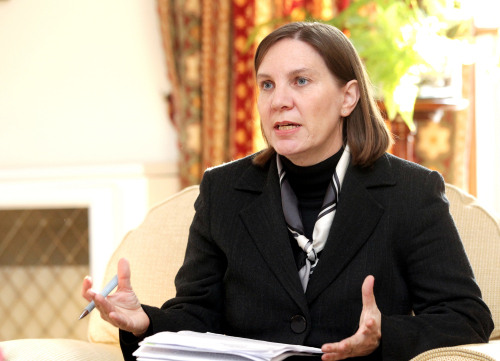North Korea’s young leader Kim Jong-un appears to be running the communist regime under collective leadership, but it remains to be seen how long the inexperienced leader will depend on the new system, Britain’s top diplomat stationed in Pyongyang said Wednesday.
Kim Jong-un, the third and youngest son of late leader Kim Jong-il, is believed to be in his late 20s and has been rapidly consolidating power since the death of his father on Dec. 17. North Korea’s military, the backbone of the country’s communist system, has openly pledged loyalty to him.
Intelligence experts in Seoul and Pyongyang have predicted that the young Kim would rule North Korea with a small group of caretakers, including his aunt and uncle, helping him make major decisions until he assumes full control. Kim Jong-il and founding leader Kim Il-sung ruled the country under a one-man dictatorship, drawing attention toward Kim Jong-un’s adoption of collective rule.
The international community is keeping a wary eye on the apparent collective rule in the North because it would be the first leadership change since the Kim dynasty’s one-man dictatorship began in 1948.
 |
Karen Wolstenholme, British ambassador to North Korea (Yonhap News) |
“Kim Jong-un seems to be very confident,” Karen Wolstenholme, the British ambassador to North Korea, told Yonhap News Agency in an interview in Seoul. She added, “(The power transition in Pyongyang) certainly appears smooth and I think having had almost 18 months preparation has made it easier for Kim Jong-un.”
The late Kim’s funeral showed that a coterie of so-called “guardians” for the young Kim emerged to help him facilitate the hereditary succession process, including Jang Song-thaek, husband of Kim Jong-il’s younger sister Kyong-hui.
“The collective leadership around him I think was the people who walked alongside the coffin (of the late Kim Jong-il), walked with the cortege at the funeral,” Karen said.
“The long-term question will be how long will Kim Jong-un need the collective leadership? How long will he rely on the collective leadership? How long will the collective leadership think he needs them?” she said.
“These I think are questions that we will only be able to answer in the next three to six months,” said the ambassador, who visited Seoul for the first time since the death of Kim.
Tension remains high on the Korean Peninsula after two deadly North Korean provocations in 2010 that left a total of 50 South Koreans dead. Some analysts predict that the North’s young leader is likely to carry out another provocation this year to consolidate his military credentials.
In response to a question about the possibility of another provocation by North Korea, Karen replied, “North Korea always has the power to surprise us, but on the ground it’s absolutely business as usual, no change at all.”
“Obviously, everybody is watching very closely, analyzing and monitoring,” she said. “But the feeling in Pyongyang is no different from before the way it felt before Kim Jong-il died.”
“One interesting thing is that during the period of mourning, the electricity supply was 24 hours a day and of very good quality, which was very good considering it was a very cold time of year as well,” Karen said.
“That has now returned pretty much to normal, so there are quite frequent power cuts, and the electricity quality is much lower, back to normal levels,” she said.
(Yonhap News)





![[Exclusive] Hyundai Mobis eyes closer ties with BYD](http://res.heraldm.com/phpwas/restmb_idxmake.php?idx=644&simg=/content/image/2024/11/25/20241125050044_0.jpg)
![[Herald Review] 'Gangnam B-Side' combines social realism with masterful suspense, performance](http://res.heraldm.com/phpwas/restmb_idxmake.php?idx=644&simg=/content/image/2024/11/25/20241125050072_0.jpg)

